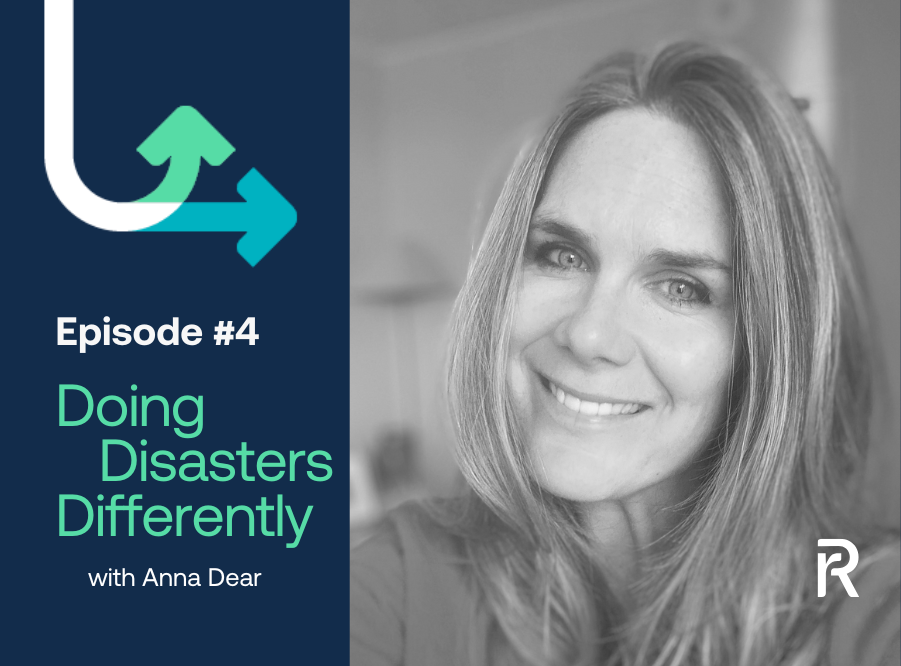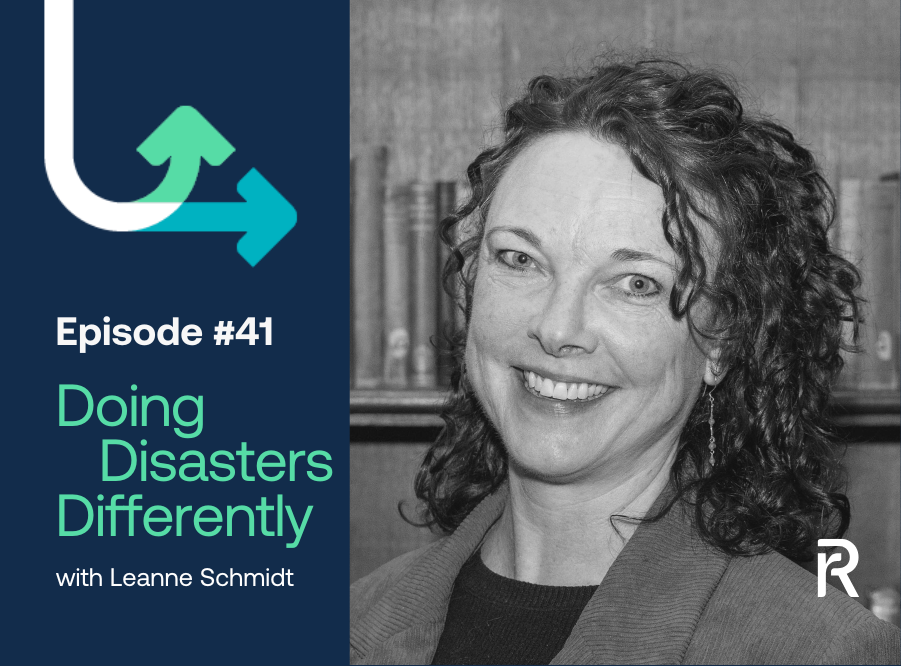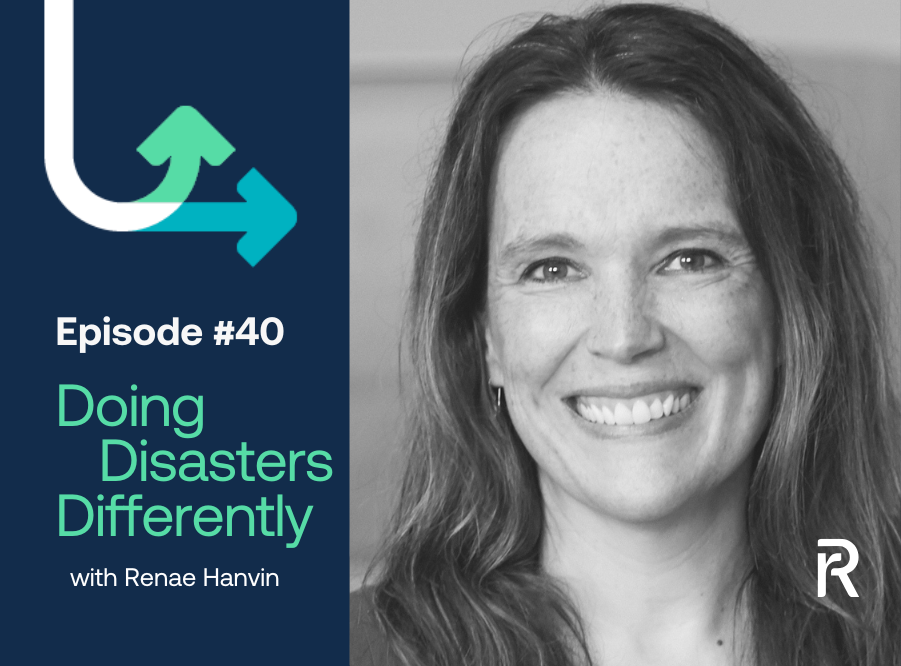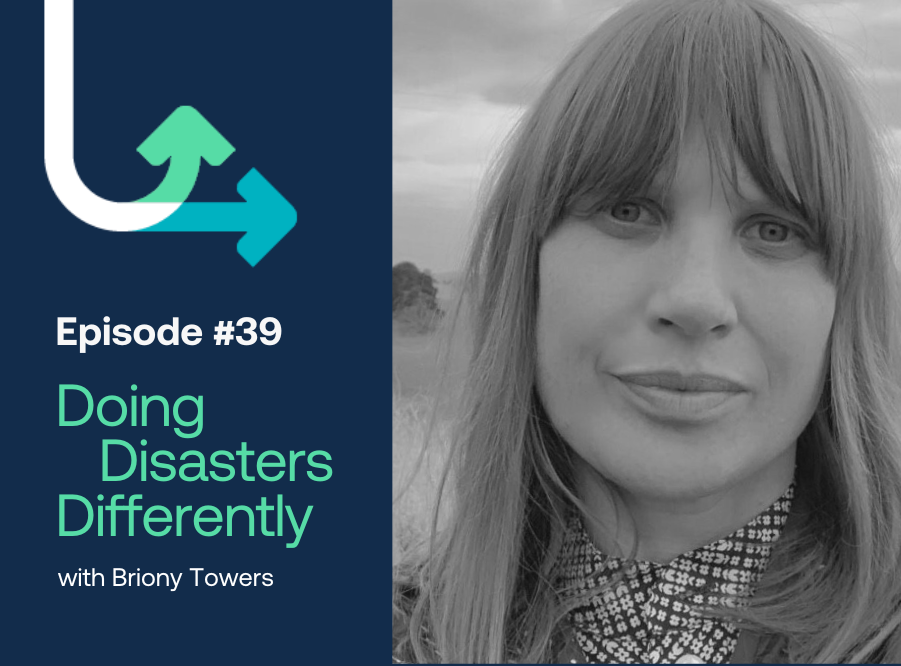
Podcast / Episode #4
#4: Unprecedented disasters provide new ways for corporate giving
By renae hanvin
Aug 10 2020
This episode
In this episode, Renae is talking with Anna Dear, who’s the Public Affairs & Sustainability Manager at Coca-Cola South Pacific. They talk about how unprecedented disasters provide news ways for corporate giving.
“I reached out to Anna during the 2019/2020 Black Summer bushfires across Australia and was really impressed by her strategic leadership to corporate disaster giving.”
There’s a lot to learn from my discussion with Anna in this episode – she definitely thinks differently and does differently.
key moments from the conversation
Anna currently leads on sustainability and community investment initiatives at Coca-Cola, South Pacific, as well as being on the advisory committee of the Coca-Cola Australia Foundation.
Starting her career as a news producer with Sky News Australia, Anna has since worked in both corporate and non-profit roles in Australia and London, including the AMP Foundation, the Victor Chang Cardiac Research Institute and Cancer Council New South Wales.
Anna has a particular passion for social justice and addressing the underlying causes of homelessness. She’s a non executive director of the Sydney Street Choir Foundation and has been a monthly volunteer with Youth Off The Streets food vans for over 15 years.
I reached out to Anna via LinkedIn because when the bushfires happened in Australia at the start of 2020, I was watching what a lot of the corporates were doing and Coca-Cola’s approach in Australia in response to the bushfires was really quite innovative.
After a quick conversation with Anna I was really impressed by her approach and leadership so I invited her to participate at the multi-jurisdictional Public-Private Partnerships Network roundtable discussion held in Sydney in February 2020.
1. To me Coca-Cola’s response to the bushfires was really innovative, authentic and true to your brand values. Was your response based on a plan or reactive to the situation?
Yeah, thanks Renae and it’s really lovely to hear that feedback because we don’t often hear lovely things like that, but it is really nice for you to preface that. But look, I think in terms of disaster relief, our response is always tailored to the specific situation at hand.
We do obviously have a set of tools and funds and working groups set up that we will mobilise in any disaster situation and that includes our global Coca-Cola Foundation, that has a disaster relief fund set up to provide humanitarian support and in house teams that we would immediately mobilize to come up with a broader strategic response. And that includes leads from our public affairs and comms and sustainability teams and finance and legal, to help lead and guide us through the process.
But I think it always is tailored because all disasters are different and I think the last thing you want is for a big corporate like Coke to come in and tell a community or an NGO what they need.
So it is really important for us to have a response that’s community led and that we’re listening to what the community needs as well. So in this instance, our bushfire response, I think was a really great example of how we really leveraged the Coke system and by system I mean, so Coca-Cola company, who I work for, so specifically Coca-Cola South Pacific and we have a network of bottlers around the world that we work with. So we look after the brands and the marketing and the formulas that go into the drinks and our bottlers look after the manufacturing and distribution of all about products and in Australia, that’s Coca Cola Amatil, who many would be familiar with.
But I think this was a really great way that we came together as a system and really leveraged all the resources that we had at hand, both locally and globally, to support such a huge crisis.
2. Can you share what specific tactical activations you implemented?
So we really did start our support right when the fire began in mid to late 2019, we had a lot of product requests coming in. So from partners like food bank and also later in the year from the defense force and they were being facilitated by us and Amatil and obviously that’s a really tangible way that we can support something like that and obviously drinks and professionals were actually really, really needed at that time. And it wasn’t really until we came back in the very early new year that we, I guess, we were like, “We need to be doing more.” And again, we got together as a system to really talk and nut out what we could do to actually provide further support and further leverage our networks.
And that involved all sorts of things, from products, to cash and philanthropic donations, to also customer assistance. So we ended up working with Salvation Army, who we have a long partnership with and we facilitated a million dollar donation from the global Coca-Cola Foundation. And we actually used our contacts in the US, so the US Salvation Army who were already set up in the system.
So that just allowed the process to be much more efficient and ensure that the funds actually landed in the hands of those that needed it, much more quickly. And I guess, again, that’s the benefit of working in a global organization like Coke, is that you do have those networks, administrative efficiencies set up.
We also made a business contribution from Coca-Cola South Pacific to each of the fire services in New South Wales, Victoria and South Australia, of a quarter of a million, I guess, to acknowledge the work that had been going on there. And obviously, really to support all of the amazing and incredible work that all the volunteers particularly were providing at the time.
And then out at bottler Amatil also provided over $375,000 in product donations and also customer financial assistance packages. So that was really an acknowledgement that a whole heap of local communities and small business owners and who Amatil call their customers, were incredibly stretched at the time, but the level of community support and community giving and generosity was amazing. So that was things like waiting, maybe invoices that would inevitably come in, loss of business revenue from during that time and also just a show of support for the local communities. And then finally, we really wanted to do something, I guess, that was uniquely Coke, but in a way that as you referenced before, was, I guess, true to our brand values, but also authentic.
And we had a Coke campaign out at the time called share a Coke, which is a long standing campaign that actually started in Australia and went global after 2011, where it has people’s names on the cans, which many people might be familiar with. And we had a couple of people comment on our social channels at the time about [inaudible 00:08:41] with these cans but for fireys and we thought long and hard about it in a way that we could do it that was meaningful and wasn’t really about recruiting people to the brand or leveraging in any way.
So we decided to create a limited edition volunteer only run of share a Coke cans and they were called share a Coke with fireys and we distributed them through the rural fire services in New South Wales, South Australia, and Victoria, as well as through food bank and through Amatil’s business development executives in all of the local towns as well, just as a way to show our gratitude and token of thanks to everyone at the time. And it was really meant as a token of thanks and a piece of memorabilia.
3. It was such an uplifting approach for so many of the firefighter volunteers. And I heard from many small businesses you helped with bills and providing product as well. Was it internally a muti-function approach?
Yes it absolutely was, I guess, a decision that we had to make and obviously, with support from the marketing teams and legal and everyone played a role in that decision. But I think, I guess, my thinking with that is always, if you’ve got the money there to donate, donate the money, don’t do it in a way where you’re asking people to buy something in order to then generate a donation because again, that is a way that many brands can leverage from these situations. And there is sometimes merit in that, but in this situation we had money there to donate and the approach behind this was really about showing our gratitude for the volunteers.
4. With COVID-19 how is your response different to the bushfires?
We had a really strong lead in from the bushfires, I think everyone’s obviously on high alert in terms of the disaster space and also, teams were already mobilized. But it was a really different situation and a very different situation across the board in terms of broader impacts on the business and people not really knowing what or how, or what space we were going to play.
I think from a bushfire perspective, there were obvious and very tangible ways that we could play a role and play a meaningful role. So I think in terms of COVID, our situation has been quite different, but it has been iterative and responsive based on the situation at hand. So I guess, given it was a global pandemic and a global disaster, there was a lot of projects happening at a global level.
So we immediately started talking to our global foundation about projects that they were supporting around the world. And I think, obviously one of the benefits of working for a company like Coke, we could look at what was happening globally and maybe see from some of the projects that were happening or in markets that were a little bit ahead of us, what their response was like, but we certainly explored a number of things. So again, we looked at can our supply chain be used in a way that’s meaningful and helpful, can our marketing teams support government messaging and we’ve seen a number of Amatil teams that have globally or regionally doing things like producing hand sanitizer at some of their plants and face masks and things like that. In Australia, I guess our approach took a little longer to come to and was more thought out, based on conversations that we were having with partners.
And we really wanted to assess what’s the role that we could play in a meaningful way. And we had some challenges around our supply chain during that time from Amatil, so product wasn’t an immediate thing that we could necessarily do, as well as broader impacts to the business as well, in terms of what support we could provide.
So that’s where we’ve really tapped into those philanthropic networks much more for COVID. So we have tapped into the global foundation again and provided a quarter of a million dollar grant to the Australian Red Cross COVID-19 collective. And we’re also re-prioritizing some of our grants through our local Coca Cola Australia Foundation this year to re-prioritize some of the funding around longer term community resilience and rebuilding as a result of COVID. So it has been quite different, but again
5. So did you have a set giving strategy before the bushfires or COVID, or is this your new strategy that you’ve organically developed?
I mean, it has certainly allowed us to start thinking about more planning in this space. We do have a very set giving strategy with both our global and local foundations and disaster relief is one of those pillars, as part of that and we have a set amount of funding that we are able to donate every year. And that’s fantastic. But I think in terms of the process that we’ve gone through internally, starting with the bush fires and then leading onto this situation with COVID, has actually allowed us to start to think more broadly around those strategies.
And I think also, we haven’t had as many, I mean, I’ve only been at Coke for a couple of years and these are the first couple of disasters that I’ve experienced here. In other organizations, you obviously have set things that you always do around the disaster, and that might be matching employee funds and looking at philanthropic grants that you can provide and ways that you can support more broadly in the community.
But as I said, I think, for us, it’s really important that the response is very much tailored to the needs of the community and the needs of the situation at the time. And that you can work from the platforms that you have, the funding rounds that you have, the people within your organization that are going to lead and guide you through the process and the resources that you can draw from as well.
6. We’ve talked a lot about the disaster relief that Coke provides, do you do anything from a resilience perspective, ie help communities in the before stages of disasters?
I think it’s a really interesting question and I think it’s a really interesting gap because I think I would say a lot of our work is done in the during and the after stage. But I think that question around what can we do before is a really important one and I think it’s one that we’ll certainly start working a little bit more internally. I mean, I guess what I would say to that is, we do a lot of work with our partners outside of, I guess, the broader disaster space and our big focus with our partnerships is on environment and sustainability.
So we do a huge amount of work in terms of clean oceans and water security and water efficiency and I guess we do have partnerships on an ongoing basis that we work more broadly. And I think for us, the most important thing is that our partnerships are all mutually beneficial, but they’re also, it’s not just about writing a check.
It’s actually about sitting down with your partner and saying, “How can we help? How can we help this partnership? How can we help this program grow?” And I feel like all the work that we do just on an ongoing everyday basis, is actually setting us up for supporting them when these kind of things do happen. So whether that’s leveraging the skills of our employees or looking at volunteering opportunities, or again, leveraging our supply chain, helping to create better capacity building within the sector and actually really, really understanding the needs of the partner that we’re working with.
With my final question always…
1. I bang on about it all the time, but I think better opportunities to collaborate and mobilize the corporate and philanthropic sector is one thing that I’m really passionate about. One of my very, very old colleagues I used to work with, I guess we had a brother sister relationship, I guess, our organizations did not us, in that we were part of a precinct but we competed for the same fundraising dollars. I remember him saying to me back in the day, he said, “A rising tide, we’ve sold boats.” And it’s always stayed with me and I think particularly in this space of philanthropy, corporate giving, community investment and sustainability, we might be competitors on the market, but we’re all there to do good in the community, make a difference.
And I think the more that we can collaborate to integrate our resources and draw from our strengths and our expertise, the better off we’re going to be. I think, also having that recognition that everyone has a role to play, it’s not just about NGOs, it’s not just about government, it’s not just about corporates, that we all have a different role to play and I think the more that we can actually come together and collaborate and bring knowledge to the table based on the sectors that we work in, the better off we’re going to be. So yeah, that’s probably the one thing that I think we probably need more of, I think it’s starting to happen a lot more, which is great.
2. More of a recognition from the broader community that everyone does have a role to play, and that we can all work together in a really positive way. I think, so often you do see, I think with particularly corporates, I think there is a general perception that corporates are a little bit nameless and faceless and potentially heartless. And I work with a bunch of super passionate, wonderful people who genuinely want to make a difference and I do see the role that corporates can play and that they can play a meaningful role in collaboration.
And I think from a partnership perspective, when you can get that golden triangle situation where governments, NGOs, business community are all coming together, I think that’s where you get the really, really wonderful outcomes.
Connect with Anna Dear



